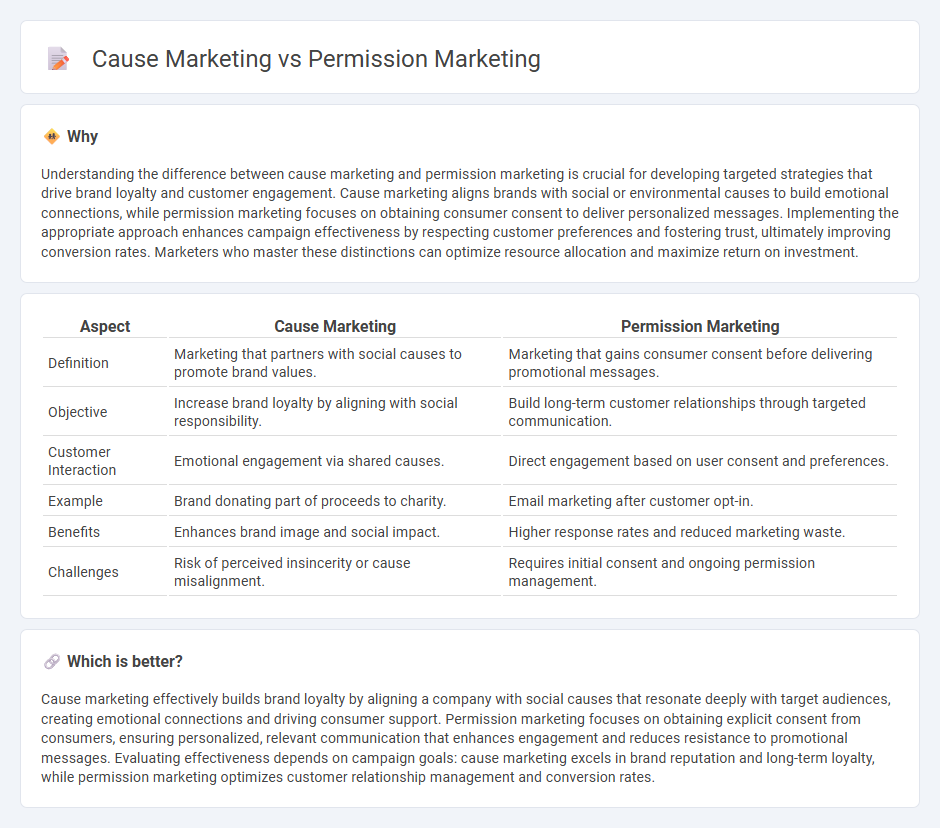
Cause marketing aligns brands with social or environmental causes to build consumer trust and drive engagement through shared values. Permission marketing focuses on gaining consumer consent to send targeted messages, enhancing relevance and response rates by respecting privacy and preferences. Explore the differences and benefits of both strategies to optimize your marketing approach.
Why it is important
Understanding the difference between cause marketing and permission marketing is crucial for developing targeted strategies that drive brand loyalty and customer engagement. Cause marketing aligns brands with social or environmental causes to build emotional connections, while permission marketing focuses on obtaining consumer consent to deliver personalized messages. Implementing the appropriate approach enhances campaign effectiveness by respecting customer preferences and fostering trust, ultimately improving conversion rates. Marketers who master these distinctions can optimize resource allocation and maximize return on investment.
Comparison Table
| Aspect | Cause Marketing | Permission Marketing |
|---|---|---|
| Definition | Marketing that partners with social causes to promote brand values. | Marketing that gains consumer consent before delivering promotional messages. |
| Objective | Increase brand loyalty by aligning with social responsibility. | Build long-term customer relationships through targeted communication. |
| Customer Interaction | Emotional engagement via shared causes. | Direct engagement based on user consent and preferences. |
| Example | Brand donating part of proceeds to charity. | Email marketing after customer opt-in. |
| Benefits | Enhances brand image and social impact. | Higher response rates and reduced marketing waste. |
| Challenges | Risk of perceived insincerity or cause misalignment. | Requires initial consent and ongoing permission management. |
Which is better?
Cause marketing effectively builds brand loyalty by aligning a company with social causes that resonate deeply with target audiences, creating emotional connections and driving consumer support. Permission marketing focuses on obtaining explicit consent from consumers, ensuring personalized, relevant communication that enhances engagement and reduces resistance to promotional messages. Evaluating effectiveness depends on campaign goals: cause marketing excels in brand reputation and long-term loyalty, while permission marketing optimizes customer relationship management and conversion rates.
Connection
Cause marketing and permission marketing are connected through their focus on building trust and long-term relationships with consumers by aligning brand values with customer interests and ethical causes. Both strategies prioritize obtaining explicit consent and meaningful engagement from the audience, enhancing brand loyalty and consumer advocacy. By integrating social responsibility with personalized communication, businesses create authentic connections that drive sustained marketing effectiveness.
Key Terms
**Permission Marketing:**
Permission marketing centers on obtaining explicit consent from consumers before delivering targeted promotional messages, enhancing engagement through personalized communication. This strategy boosts customer trust and loyalty by respecting privacy and reducing intrusive advertising. Explore how permission marketing transforms customer relationships and drives sustainable growth.
Opt-in
Permission marketing centers on obtaining explicit consumer consent, such as opt-in email subscriptions, ensuring targeted and relevant communication that respects user privacy. Cause marketing integrates social or environmental causes into campaigns, often encouraging opt-in participation to build emotional connections and brand loyalty. Explore the nuances of how opt-in strategies enhance both permission and cause marketing effectiveness.
Personalization
Permission marketing emphasizes personalized interactions by obtaining explicit consent from consumers to receive tailored content, enhancing engagement and trust. Cause marketing integrates corporate social responsibility with personalized messaging to align brand values with consumer passions, creating emotional connections. Explore how these marketing strategies leverage personalization to drive deeper customer loyalty and brand affinity.
Source and External Links
What is Permission Marketing? (Explained With Examples) - Permission marketing is a strategy focused on obtaining explicit consent from potential customers before sending promotional messages, enhancing engagement by targeting individuals who have shown interest through opt-in methods like email subscriptions.
Permission Marketing: A Definitive Guide (With Steps) | Indeed.com - This marketing approach requires customers to agree to receive promotions, differentiating it from traditional direct marketing by using customer-provided information to build relationships and tailor content.
What is Permission-Based Marketing: Definition, Benefits, & Examples - Permission marketing relies on consumer opt-in to receive messaging, allowing brands to deliver aligned, relevant content and respecting the consumer's choice to opt out anytime, as originally conceptualized by Seth Godin.
 dowidth.com
dowidth.com